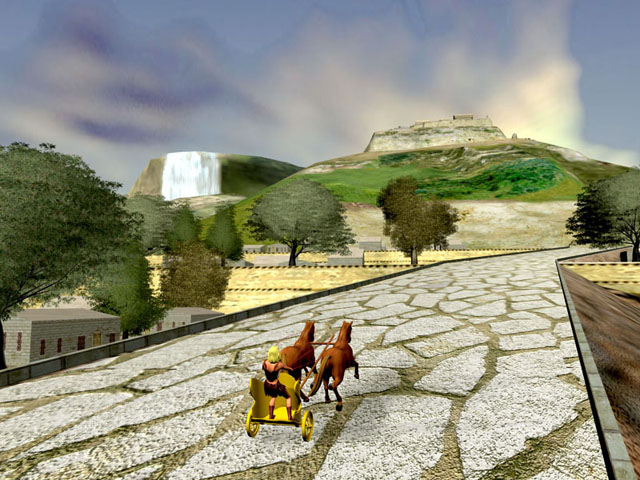
THE KING.
Dick had broken his jaw, poor fellow! The doctor said that it must be bound up for six weeks, so, of course, Dick could talk only by signs or by writing on a slate.
He begged for stories and to be fanned, and that the troublesome flies might be kept away.
"Shall I tell about a king and his beautiful palace?" asked Dick's sister, Helen. Dick nodded; he was always glad to hear about a king. He thought right away of Alexander and Caesar and Napoleon, or of some other warriors, with armies and banners.
"My king lived almost three thousand years ago, in a land far away across the sea," said Helen.
"Put on your guessing-cap, Dick, and listen 'very sharp’. One day this king resolved to build himself a palace. He had many men and ships, that he sent to distant countries for gold and precious stones and beautiful wood with which to build his palace. I must just say, though, that before he began his own house, he was busy building one for another great King; it was very beautiful-the stones were large and many of them costly; the whole house was overlaid with gold, and the walls were covered with figures of heavenly beings and with representations of palm trees and flowers. The king spent seven years in building that house."
"Tell me about his own palace," wrote Dick.
“He was thirteen years in building it," said Helen. "Wouldn't you like to shut your eyes and open them again quickly, and find yourself in one of the rooms of that palace? You would look with wonder at the curious doors and windows, at the carvings on the walls and the beautiful hangings of linen and silk, and at the ivory throne.
The ivory had been brought in ships from a land far away."
Dick tried to remember some things that he had read about ivory. He supposed that Helen was telling about some old king of India. He would listen awhile, though, before he would venture to guess.
"Do you want to hear about the ivory throne?" asked Helen. "It must have been raised quite high; one had to go up six steps to reach it. There were lions on either side of the steps, Dick; not live lions, you know; only figures of lions."
"Was the king Alexander the Great?" wrote Dick.
"Oh no; that is not near to a true guess. Besides having thirty thousand men to work for him, the king had as many horses and chariots as he wished-enough, indeed, to lend to his friends, the kings of other lands. How many chariots, now, do you suppose that he had?"
Dick did not know.
"More than a thousand. Sometime I will show you a picture of such chariots as they used in those days. The king sent far away to another country for fine horses. He gave one hundred and fifty silver shekels apiece for these horses. A silver shekel would be about fifty-nine cents of our money. How many dollars would one of his horses cost?"
Dick did the sum in a moment, and wrote,
"Eighty-eight dollars and fifty cents."
"Besides chariots and horses and grand palaces, the king had beautiful ships. Once in three years these ships would come home, bringing gold and silver and ivory and apes and peacocks." Dick thought that he had heard enough about the king's gold and silver and ivory, but his eyes brightened at the mention of apes and peacocks.
"Queer things to have in a palace!" he thought.
"One day the queen of another country came to see the king. He was very polite to her. He showed her everything about his beautiful palace, and answered all her hard questions."
"Did she see the apes and the peacocks?" asked Dick.
"I suppose so," said Helen. "The king could tell her all about their curious ways; for it is said that he had studied about trees and flowers and grass, and that he could tell about beasts and birds and fishes, and even about creeping things."
Dick sighed. "That king must have been happy," he wrote. "There wasn't a thing he couldn't buy."
"True, Dick! He as much as says that he got everything he set his heart upon; still he was not happy. I have been telling you about King Solomon. If he could come back to this world and walk into this room, I am almost sure as to what he would say. He would lay his hand on your head, and speak just the words that he wrote so long ago: A good name is rather to be chosen than great riches, and loving favor rather than silver and gold.' I think, too, that he would add those other words: ‘The fear of the Lord is the beginning of wisdom; a good understanding have all they that keep his commandments.' Perhaps he would not go away till he had said to us-almost the last words that he ever wrote for the world-' Hear the conclusion of the whole matter: Fear God and keep his commandments; for this is the whole duty of man.'"
Meade Middleton.